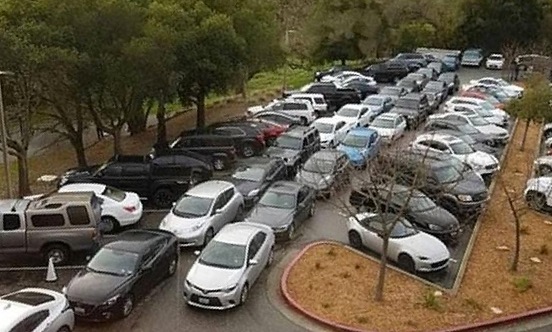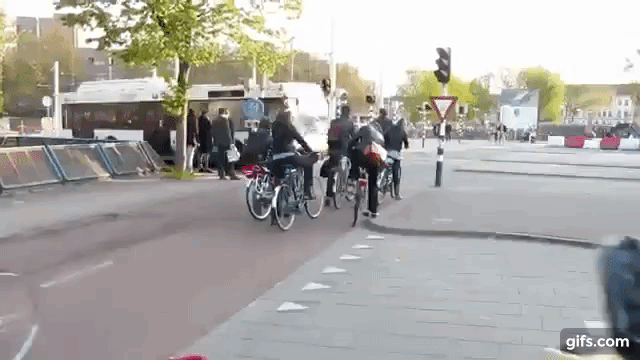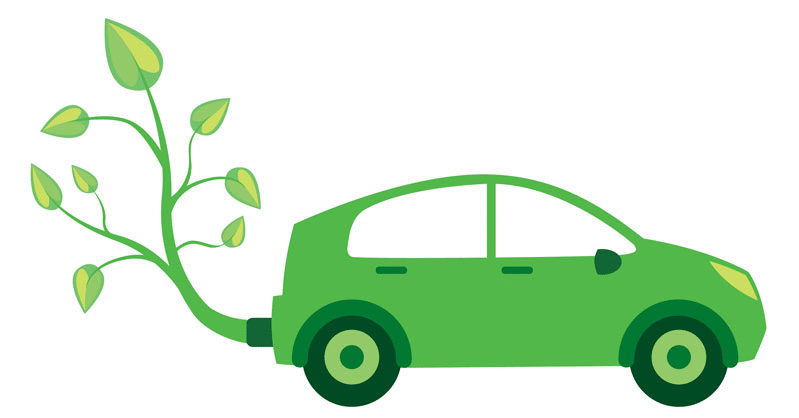But I was doing what they wanted me to! I’m trying to be responsible and eco-friendly. I was positively encouraged to buy this car by the authorities, yet now they’re persecuting me for using it. It’s just not fair. I expect compensation.
Does this sound like the complaint of today’s diesel drivers?
What if the exact same thing is being repeated in a few years’ time by electric car drivers?
If, or hopefully when, we want to really have healthy, liveable cities then we’ll have to get to grips with limiting car use. it won’t matter what kind of fuel cars use. The epidemic of inactivity and the extravagant use of space that ever more cars require simply can’t continue for ever. There are intractable downsides to the alluring convenience of cars which technology isn’t going to solve for us. Driving will need to be increasingly limited, and so drivers will probably feel penalised.
the answer to the problem of the American car is not under the hood, and we’re not going to find a bright green future by looking there.
We may invest huge amounts (whether privately or through government) to shift to fully electric vehicles. It may mean we get far cleaner air. But we’ll still need to introduce road pricing and find ways to discourage driving and parking in cities.

Electric cars are going to save the world. They’re clean, green and sustainable!
— too many people, in not as many words
But this is the message we currently get from government, councils, the less dinosaurish parts of the motor industry (those not still clinging to a future where fossils will be burned forever), and they’re cheered on even by Greenpeace (whose only proposed solution to air pollution seems to be to replace diesel with electric vehicles).
So the dream goes… if only everyone bought electric cars. Let’s subsidise them, incentivise them and roll out the red carpet (use of bus lanes, free charging and free parking) for them.
But let’s stop getting dazzled by the blue LEDs, and hang on just a futuristic, quietly humming minute.
What if we weigh up what cars going electric can and can’t improve.
[To be clear: I do think electric vehicles are better than non-electric vehicles (especially for our planet). Any vehicles which are driven need to be electric as soon as possible. But we have to think much wider and more imaginatively about the effects of driving than just focusing on replacing one propulsion technology with another.]
The good: better than petrol or diesel
- Less pollution in the air, especially in urban areas
- More efficient use of energy and modestly reduced climate impacts (see ‘note’ at the end)
- Less noise pollution
- Help balance demand for electricity by using their battery capacity when plugged in (in future)
The bad: Problems with driving which exist the same with electric vehicles
- Parking (cars consume great chunks of our valuable city space, roadside space, and even pavement space)
- Congestion (they’re large, fast machines, which take up a lot of space, making them inefficient for moving people in urban areas)
- Making us inactive – inactive lifestyles have become normal and increasingly hard to avoid because of driving. Public health professionals are desperate for people to do more daily physical activity (20 million people in the UK do none), as it dramatically helps with so many health problems. By far the easiest way to do this is during daily travel. But when driving squeezes out active travel (walking or cycling) for even short trips, people find it harder than ever to fit in.
- Severance – dividing up communities with hostile roads, meaning fewer people know their neighbours
- Stressful and antisocial – being inside cars isolates and insulates us from each other and our surroundings. This encourages anger, resentment of anyone ‘in my way’, and damages mental health and basic empathy. Honk honk!
- Widening inequality. The more our society is shaped for driving, the more excluded from things — jobs, friends, health services — people become who can’t or don’t want to drive
- Expensive infrastructure – just maintaining England’s roads costs all of us (whether we drive or not) £4.5bn a year, with tens of billions going towards building new road capacity in the next few years (which increases demand, so is often self-defeating)
- Encourages car-dependent town/city planning which makes other things more difficult (like out of town shopping, sprawling housing areas with no local services)
- Resources used in manufacturing them – all motor vehicles are relatively large, heavy machines, electric or otherwise, and have a hefty footprint from the energy and materials to make them
- Death and destruction. Thousands of people are killed directly by driving each year. In the UK each year 1700 people are killed and 180,000 are injured, 22,000 of them seriously. This includes many people not even on or using the roads – just walking around or even inside buildings.
Looking good so far, right?
So, just going electric doesn’t do anything to help with all these things above. But I think there are also some things about the shift to electric cars that are oddly not yet talked about at all.
The ugly: how electric cars are actually worse
- They’re really, really cheap to drive. Almost free. (Wait, isn’t that a good thing? We’ll get to this below.)
- The cost is almost all up-front. That ‘almost free driving’ is partly because with an electric car you’ve paid for most of your driving already, before you drive it. Which implicitly makes you feel like you should drive it more to help it “pay for itself”.
- Loss of tax revenue from fuel – the UK government gets 4% of all funding for our public services from fuel duty (£27.6bn). This doesn’t get spent on roads specifically (that comes from general taxes, which we pay whether or not we drive), and even all driving taxes together don’t cover the costs driving incurs (when you include health problems, infrastructure, enforcement etc).
- Smugness – that warm, cosy feeling you get when you know you’re doing your bit, driving a sleek glossy bauble emitting nothing but sunshine, green leaves and good vibes, man)… which helps us to ignore the whole ‘bad’ list above, and maybe is why so few people have started thinking about this set of ‘worse’ things at all.
The big one here may be the first – how cheap electric cars are to drive.
For almost as long as vehicles have been around, government has taxed driving them, mostly through fuel. It’s only fair since they cost society vast amounts to provide roads for, and to pay for all the costs they create like spiralling health crises (oh, wait, don’t we cover that in the way we tax motoring now? No we don’t).
But electric cars are often charged at home, using relatively frugal pennies of power from the grid… or almost no cost if you (increasingly likely) have your own solar panels (again, the cost is paid up-front, though still cheap overall). Charging at commercial charge points is starting to cost more, but still not much compared to fuel duty.
As more vehicles go electric, the billions raised in fuel duty (roughly the whole cost of education funding) is going to have to come from somewhere else. Maybe from a mandatory GPS-tracked road pricing system. Upsides would be that this could make it possible to charge more for driving in certain areas, like congested cities, or at certain times. But it may well also lead to an (even more than there is now) toxic assumption by some drivers of entitlement and ownership of the public roads: “I’m paying to drive here [because my road use causes large costs] so you people cycling, horse riding or even walking, are freeloaders and should get out of my way”.
When people feel that their driving costs them more (either fuel prices going up or when they have less to spend, such as in a recession), they drive less. And vice versa – cheap driving means more driving.
So what other effect can we expect from electric cars being far cheaper to drive than for people to drive them a lot more?
Which goes back to that second list of problems with driving which stay with us, even when it’s all electric. And the more people drive, the bigger all those problems become to us and our communities.

Conclusion (so what?)
Alright, hippy, go and live in a cave, and don’t expect any deliveries, pal.
Not quite. A busy, thriving, modern economy can run with far, far less driving than the current UK does now (the Netherlands is hardly cave-dwelling; its richer than us). In fact, it will have to.
Plenty of vehicles are super-useful and making them electric doesn’t have a downside – it’s urgently needed: buses for example, and fire engines and ambulances (etc etc).
And some amount of current car driving is really useful and necessary (75%… 50%… 20%? It all depends how big your imagination is), and so any driving that is done should be electric as soon as possible.
But let’s not fool ourselves into imagining that by changing what powers our vehicles we can solve most of the problems they cause.
Electric power has to become simply an expectation for vehicles, not a virtue.
So what else should we do?

For a genuinely more sustainable, healthier (physically and mentally) and fairer way to do transport we’ll need to focus much more on these things:
- doing many more short journeys by foot or cycle
- making that both possible (for normal, non-dedicated people) and attractive by dedicating road space, and priority (like crossings), to walking and cycling
- using buses, trams, coaches and trains more for medium and longer journeys, and improving them (probably by renationalising) and shifting investment into them and away from roads
- moving more freight by rail and less by trucks on the road
- doing many local deliveries by light cycle vehicles like cargo bikes
- using cars more as on-demand with hourly rental ‘car clubs’ rather than owning them
- moderating driving by road charging; reducing capacity of and charging more for parking, and introducing congestion charges
- And a diesel scrappage scheme? If we must have one, we shouldn’t just encourage more car-buying. “We need fewer cars, not newer cars.” Why not offer multiples of the scrappage value if you take it as vouchers for public transport, car clubs, electric/cargo bikes?
It all comes down to imagination. What kind of future do we want?

(Non-cave dwellers in the Netherlands, using the cycle infrastructure their government has invested in and carved out of existing roads for decades.)
Note: Notice that nothing here is bashing the electricity to power these electric cars. I’m not going for the cliches of “they’re really coal powered cars”, “we’ll need a billion extra wind turbines” etc.
Because that’s not really the problem.
We already use vast amounts of electricity (and other energy) getting our oil-based fuel: exploring, drilling, transporting, refining (in intensive industrial heating processes) and more transporting it. That lot uses similar amounts of energy to charging cars for the same amount of driving. (Though with the petrol/diesel you still have to burn it in the engine and cause further emissions there.) So as we just manufacture less oil-based fuel, it is entirely plausible that electric cars will cause no extra demand for electricity than we already have.
Also, electricity isn’t an energy source, just a carrier. The way we generate electricity is changing fast, and our grid supply is fairly quickly becoming cleaner. So while some electricity generated today is from high-carbon coal and gas, it doesn’t have to be, and won’t be for much longer. And car charging is pretty well suited to being done slowly (when parked all day) and at flexible times (overnight etc) so can be fitted into and flexed with the more varying patterns of renewable-based supplies.
Another note: Self-driving vehicles. I’ve not even touched on the effects of those, but they’re coming too. They may improve some aspects, but I can’t see them helping with most of the issues listed above. And there are probably other things that they’ll make worse too, by making “driving” (or just getting around sat in a “car”, or whatever they’re called by then) more convenient and less arduous… so people will have even more incentive to do it more.
But we’ve got enough here-and-now effects, and enough of a prize of a healthier population and society, so we should probably see how fast we can de-car, not how long we can hold on to them for.
